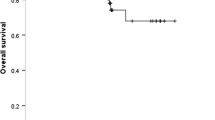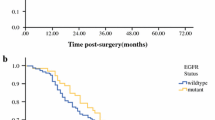Abstract
Purpose
To investigate the prognostic value of epidermal growth factor receptor (EGFR) mutations in a series of Taiwanese patients with primary resected lung adenocarcinomas never treated with epidermal growth factor receptor tyrosine kinase (TK) inhibitor.
Patients and methods
A total of 27 of 35 patients whose EGFR mutational status in exons 18, 19, and 21 of the TK domain had been previously determined using nested polymerase chain reaction (PCR) were included in this retrospective study. All 27 patients underwent potentially curative pulmonary resection. Clinicopathological information was obtained from patient records and pathology reports. Disease-free survival (DFS) and overall survival (OS) of patients were estimated with the Kaplan–Meier method, and Cox regression model was used for multivariate analysis.
Results
Heterozygous EGFR mutations were detected in 15 of 27 patients (55.5%). There was no significant difference in DFS between patients with wild-type EGFR (median, 16.87 months) and mutant EGFR (median, 18.13 months; P = 0.83). No significant difference in OS was also noted between the wild-type and mutant groups (P = 0.45, median follow-up 22.6 months). Cox regression model and multivariate analysis of survival difference by age, stage, histology, and adjuvant treatment did not reach statistical significance.
Conclusion
EGFR mutations do not have significant prognostic value in primary resected non-small cell lung cancer (NSCLC), and further well-designed large prospective studies are warranted to determine the prognostic value of EGFR mutations in NSCLC.


Similar content being viewed by others
References
Jemal A, et al. Cancer statistics, 2006. CA Cancer J Clin 2006;56:106–30.
Mountain CF. Revisions in the international system for Staging Lung Cancer. Chest 1997;111:1710–7.
Nicholson RI, Gee JM, Harper ME. EGFR and cancer prognosis. Eur J Cancer 2001;37 Suppl 4:S9–15.
Onn A, et al. Synchronous overexpression of epidermal growth factor receptor and HER2-neu protein is a predictor of poor outcome in patients with stage I non-small cell lung cancer. Clin Cancer Res 2004;10:136–43.
Lynch TJ, et al. Activating mutations in the epidermal growth factor receptor underlying responsiveness of non-small-cell lung cancer to gefitinib. N Engl J Med 2004;350:2129–39.
Paez JG, et al. EGFR mutations in lung cancer: correlation with clinical response to gefitinib therapy. Science 2004;304:1497–500.
Sordella R, Bell DW, Haber DA, Settleman J. Gefitinib-sensitizing EGFR mutations in lung cancer activate anti-apoptotic pathways. Science 2004;305:1163–7.
Hsieh RK, Lim KH, Kuo HT, Tzen CY, Huang MJ. Female sex and bronchioloalveolar pathologic subtype predict EGFR mutations in non-small cell lung cancer. Chest 2005;128:317–21.
Kosaka T, et al. Mutations of the epidermal growth factor receptor gene in lung cancer: biological and clinical implications. Cancer Res 2004;64:8919–23.
Shigematsu H, et al. Clinical and biological features associated with epidermal growth factor receptor gene mutations in lung cancers. J Natl Cancer Inst 2005;97:339–46.
Sasaki H, et al. EGFR and erbB2 mutation status in Japanese lung cancer patients. Int J Cancer 2006;118:180–4.
Eberhard DA, et al. Mutations in the epidermal growth factor receptor and in KRAS are predictive and prognostic indicators in patients with non-small-cell lung cancer treated with chemotherapy alone and in combination with erlotinib. J Clin Oncol 2005;23:5900–9.
Tsao MS, et al. Erlotinib in lung cancer—molecular and clinical predictors of outcome. N Engl J Med 2005;353:133–44.
Shepherd FA, Tsao MS. Unraveling the mystery of prognostic and predictive factors in epidermal growth factor receptor therapy. J Clin Oncol 2006;24:1219–20; author reply 1220–11.
Hirsch FR, et al. Epidermal growth factor receptor in non-small-cell lung carcinomas: correlation between gene copy number and protein expression and impact on prognosis. J Clin Oncol 2003;21:3798–807.
Hirsch FR, et al. Molecular predictors of outcome with gefitinib in a phase III placebo-controlled study in advanced non-small-cell lung cancer. J Clin Oncol 2006;24:5034–42.
Acknowledgement
This study was supported in part by grants from AstraZeneca.
Author information
Authors and Affiliations
Corresponding author
Rights and permissions
About this article
Cite this article
Lim, KH., Huang, MJ., Liu, HC. et al. Lack of prognostic value of EGFR mutations in primary resected non-small cell lung cancer. Med Oncol 24, 388–393 (2007). https://doi.org/10.1007/s12032-007-0018-8
Received:
Accepted:
Published:
Issue Date:
DOI: https://doi.org/10.1007/s12032-007-0018-8




